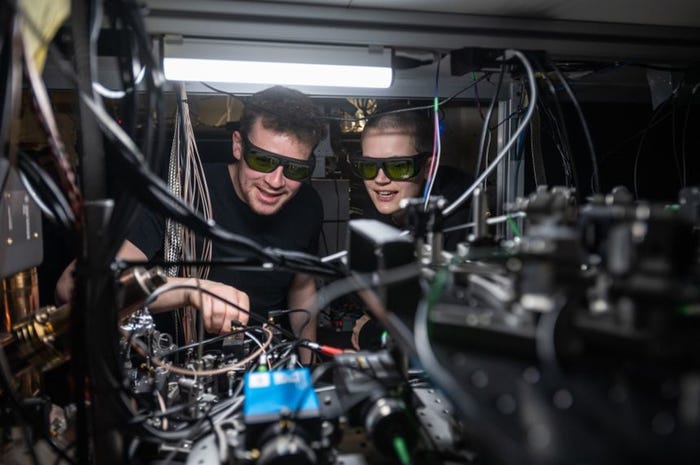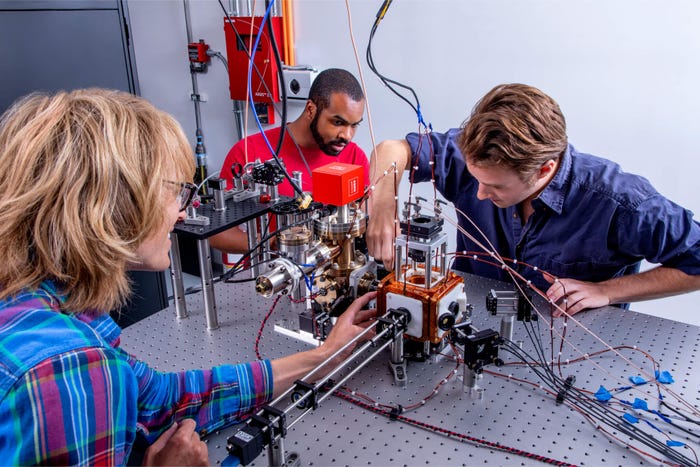
Connects decision-makers and solutions creators to what's next in quantum computing
How To Get Started in Quantum - Early Adopters Offer AdviceHow To Get Started in Quantum - Early Adopters Offer Advice
Practical use cases require improved technology, collaboration and preparation

There are many emerging use cases for quantum computing, but both the technology and the marketplace need to overcome several obstacles before adopters see the real advantages, according to a panel at the City Quantum Summit this week.
Novo Nordisk – Get Use Case Experts to Work With Quantum Experts
“We need better machines with improved control of the qubits, whether they’re individual electrons, photons or whatever, and of course, we would need the entire stack,” said Lene Oddershede, senior vice-president at medical treatment and research organization Novo Nordisk Foundation.
She said the industry also needs interdisciplinary collaboration, but that’s hard because there's a divide between the quantum technology experts and the use case experts, and they usually don't speak the same language.
“The physicists say why do we have these people from the life sciences on board? They're slowing us down. And the people from life sciences say we don’t need this technology; we’ll just wait a few years and see where it goes. The foundation tries to initiate projects where we encourage different types of people to collaborate. But if we wait, the train has left and someone else is in the lead.”
SandboxAQ – Be Ready for the Opportunity and Prepared for the Risk
Nadia Carlsten, vice-president of product and quantum and AI software company SandboxAQ said that since the company doesn’t build quantum computers, it doesn’t worry about the technology race.
“But our customers do, and what they are hearing is constant announcements of more qubits and that quantum computers are almost here. What they want to know is what does it mean for me?” she said.
Carlsten said there are two camps of customers: those who are excited about quantum computing and what they can do with it and those who fear that quantum will break encryption, despite national and international efforts to introduce post-quantum cryptography standards.
“The impact on security really becomes problematic if board members and security folks that have to worry about the impact of quantum decryption don't know what that means,” she said.
“What I'm trying to tell customers is yes, you don't have to worry about it today – you don't have to lose sleep that current quantum computers have already infiltrated your network somehow. But at the same time, you do have to get ready for this world of quantum today and it has to be a balanced conversation.”
Vodafone Group – Develop an Ecosystem of Stakeholders and Suppliers
Luke Ibbetson, head of R&D at Vodafone Group, said that message resonated with the telecommunications sector, which is looking at the potential impact of quantum technologies and needs to start early before quantum computing becomes too advanced.
“We operate in complex technology domains with multiple generations of technology and thousands of suppliers. And we have cryptography buried in every almost dark corner of all of our systems and our processes in our organization. I don't think we're alone and not understanding exactly where we are potentially vulnerable in cryptography,” he said.
Ibbetson said the first step is to take a detailed cryptographic inventory, advice echoed in a set of guidelines Vodafone and IBM have released.
“IBM and Vodafone formed a task force almost exactly a year ago to coalesce that telecommunications ecosystem which comprises not just the network operators, but also the technology suppliers, our customers and our stakeholders into addressing the need to prepare for the quantum era,” Ibbetson said.
“We published the first sets of impact guidance in February and followed that last week with some quantum risk assessment guidelines, which start goings to the next level down to make it a little bit more programmatic for companies needing to prepare for the path towards quantum.”
HSBC – Understand the Potential Impacts
Georgios Korpas, senior research scientist at HSBC, said within financial services there are a lot of use cases where quantum computing might offer some advantage.
“One of our main focuses is to understand what these use cases are and what is the best way to approach them,” he said. “At the end of the day, the potential new solution may not be quantum. That's still great, that's the evolution of quantum within the space. We have a lot of interest in optimization, machine, learning and communications. Security is a big one, of course. My job is to understand the potential impact of this technology, to look at this field and ask what are the use cases. What are the algorithms?
“HSBC has realized that innovation also lies within the ‘keyboard’ of quantum computers. That is, how do you import data into quantum computers? And the ‘monitor’, how do you read the data that comes out of quantum computers? This is as important as the technology itself.”
About the Author
You May Also Like






